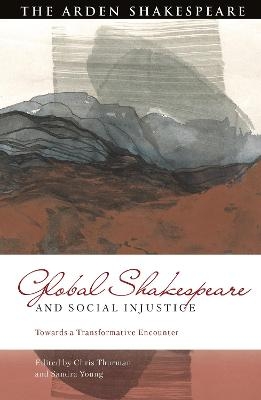
Global Shakespeare and Social Injustice
The Arden Shakespeare (Verlag)
978-1-350-33509-7 (ISBN)
A focus on social justice, and on the many forms of social injustice that demand our attention, leads to a consideration of the North/South constructions that have tended to shape Global Shakespeare conceptually, in the same way the material histories of ‘North’ and ‘South’ have shaped global injustice as we recognise it today. Such a focus invites us to consider the creative ways in which Shakespeare’s imagination has been taken up by theatre-makers and scholars alike, and marshalled in pursuit of a more just world.
Chris Thurman is the Director of the Tsikinya-Chaka Centre at Wits University, South Africa. He is the editor of Shakespeare in Southern Africa, president of the Shakespeare Society of Southern Africa and founder of Shakespeare ZA. He edited South African Essays on ‘Universal’ Shakespeare (2014). Sandra Young is Professor of English Literary Studies at the University of Cape Town, South Africa. Her publications include Shakespeare in the Global South: Stories of Oceans Crossed in Contemporary Adaptation (The Arden Shakespeare, 2019) and The Early Modern Global South in Print: Textual Form and the Production of Human Difference as Knowledge (2015).
List of Illustrations
Notes on Contributors
Editors' Introduction
1. Global Shakespeare and its Confrontation with Social Justice, Chris Thurman (Wits University, South Africa) and Sandra Young (University of Cape Town, south Africa)
Section One: Scholarship and Social Justice: Questions for the Field
2. Re-thinking 'Global Shakespeare' for Social Justice, Susan Bennett (University of Calgary, Canada)
3. Caliban in an Era of Mass Migration, Linda Gregerson (University of Michigan, USA)
4. What Makes Global Shakespeares an Exercise in Ethics? Alexa Alice Joubin (George Washington University, USA)
Section Two: Resisting Racial Logics
5. Making Whiteness out of 'Nothing': The Recurring Comedic Torture of (Pregnant) Black Women from Medieval to Modern, Dyese Elliott-Newton (UCLA, USA)
6. Feeling in Justice: Racecraft and The Merchant of Venice, Derrick Higginbotham (University of Hawai’i at Manoa, USA)
7. Marking Muslims: The Prince of Morocco and the Racialization of Islam in The Merchant of Venice, Hassana Moosa (Kings College, London, UK)
Section Three: Imagining Freedom with Shakespeare
8. Signing for Justice: Politicized Reading and Performative Writing in the Robben Island Shakespeare, Kai Wiegandt (Barenboim-Said Akademie, Berlin)
9. 'Men at some times are masters of their fates': The Gallowfield Players perform Julius Caesar, Rowan Mackenzie (independent scholar, UK)
Section Four: Placing Sex and Gender under Scrutiny
10. The 'sign and semblance of her honour': Petrarchan Slander and Gender-based Violence in Three Shakespearean Plays, Kirsten Dey (University of Pretoria, South Africa)
11. Open-gendered Casting in Shakespeare Performance, Abraham Stoll (University of San Diego, USA)
12. Teaching Titus Andronicus and Ovidian Myth when Sexual Violence is on the Public Stage, Wendy Beth Hyman (Oberlin College, USA)
Notes
Index
| Erscheinungsdatum | 16.05.2023 |
|---|---|
| Reihe/Serie | Global Shakespeare Inverted |
| Mitarbeit |
Herausgeber (Serie): Bi-qi Beatrice Lei, Dr David Schalkwyk, Silvia Bigliazzi |
| Zusatzinfo | 2 bw illus |
| Verlagsort | London |
| Sprache | englisch |
| Maße | 138 x 216 mm |
| Themenwelt | Kunst / Musik / Theater ► Theater / Ballett |
| Geisteswissenschaften ► Sprach- / Literaturwissenschaft ► Anglistik / Amerikanistik | |
| Geisteswissenschaften ► Sprach- / Literaturwissenschaft ► Literaturgeschichte | |
| Geisteswissenschaften ► Sprach- / Literaturwissenschaft ► Literaturwissenschaft | |
| Sozialwissenschaften ► Politik / Verwaltung | |
| ISBN-10 | 1-350-33509-6 / 1350335096 |
| ISBN-13 | 978-1-350-33509-7 / 9781350335097 |
| Zustand | Neuware |
| Informationen gemäß Produktsicherheitsverordnung (GPSR) | |
| Haben Sie eine Frage zum Produkt? |
aus dem Bereich


